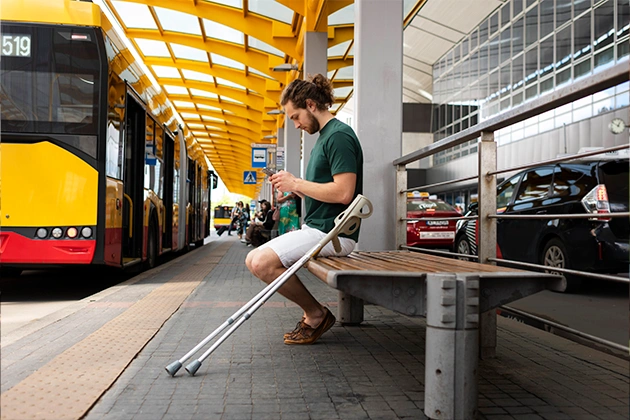Bus crashes are among Michigan’s most dangerous accidents, and quick action to find the right Michigan bus accident attorney can transform your case outcome. Most busses lack simple safety features such as seat belts, which leaves passengers at risk of serious injuries during collisions.
Time plays a crucial role in public bus accident lawsuits. Your case needs written notice within 60 days of the accident if you suffer injuries on regional bus services like SMART or DDOT. This deadline is much shorter than the standard three-year statute of limitations that applies to most injury claims. Your right to bus injury compensation depends on meeting these strict deadlines. This piece guides you through your legal rights and the steps needed to protect yourself under Michigan accident law.
Common Injuries on Michigan Public Transport
Public transportation injuries go way beyond vehicle collisions. Crashes remain a serious concern, but passengers are also injured in many other ways that require a Michigan bus accident attorney’s help.
Slips and falls create some of the biggest risks on public transit. Wet floors from snow or rain make buses dangerous for passengers. Poor lighting on steep stairs and loose handrails can lead to serious falls.
People often get hurt while getting on or off buses. Missing handrails, broken doors, slippery stairs, damaged curbs, and potholes lead to these accidents. Such accidents can hurt someone’s face, head, neck, back, hands, and wrists—and they need lots of medical care.
Sudden bus movements create another safety issue. Buses don’t usually have seatbelts, so passengers can easily lose their balance. A recent case shows just how dangerous this can be. A party bus flipped over on I-75 near Monroe County, and eleven people—mostly teens – ended up in hospitals with injuries from minor to critical.
These accidents can cause whiplash, burns, head trauma, brain injuries, spine damage, and broken bones. On top of that, passengers might hurt their backs during sudden stops, injure their necks from falls, or damage their hips on poorly kept surfaces.
This pattern of injuries helps build a strong case for compensation under Michigan accident law.
Your Legal Rights After a Bus Injury
Michigan’s legal system gives bus accident victims specific rights. Bus accident victims can file two different types of claims: No-Fault benefits and third-party claims.
No-Fault benefits serve as a financial safety net. These benefits cover medical bills, lost wages (up to 85% of gross income), household replacement services, and attendant care. Your own auto insurance company pays these benefits if you have a policy. The coverage might come from your spouse’s policy, a relative who lives in your home, or the bus company’s insurance if you don’t.
You can also pursue a third-party claim against the driver who caused the accident to get pain and suffering compensation. The law requires you to prove a “serious impairment of body function” that changed your normal life.
Time limits play a vital role. Claims against regional transportation authorities (DDOT, SMART, CATA) must submit written notice within 60 days of the accident. State-owned bus claims need filing with the Court of Claims within 6 months. Regular personal injury claims have a three-year deadline.
Michigan law allows claims when public employees drive government vehicles negligently, even with governmental immunity protections. You deserve compensation for medical expenses, lost wages, and pain and suffering when someone else’s negligence causes harm.
Steps to Take After a Public Bus Accident
Quick action after a public bus accident helps protect your health and legal rights. Get medical help right away, even if injuries seem minor. Conditions like whiplash, internal injuries, and concussions often show symptoms hours or days later.
Make sure you document everything. Take plenty of photos of your injuries, the accident scene, hazards, and the vehicle’s identification numbers. Get contact details from witnesses since their statements can confirm your version of the whole ordeal.
Let the driver or transit employee know about the accident and get a copy of the internal report. This documentation is vital evidence for your claim.
Michigan’s strict notice requirements are non-negotiable. Regional transportation authorities like DDOT, SMART, or CATA require written notice within 60 days of the accident, and missing that window can permanently block your claim. These short deadlines go hand-in-hand with Michigan’s broader civil requirements. As ConsumerShield explains, “the statute of limitations for filing a claim after an accident is three years”, so victims of public-transport injuries must act quickly to protect their rights.
State-owned bus accidents require you to file your claim or notice with the Court of Claims within 6 months.
On top of that, you need to submit an application for No-Fault benefits within 1 year after the accident to cover medical bills and lost wages.
Talk to a Michigan bus accident attorney before giving statements or signing documents. Insurance companies and transit authorities work with legal teams that specifically train to minimize payouts.
Conclusion
Quick action and legal expertise are crucial if you’re hurt while using Michigan’s public transportation. Time definitely works against victims, especially with transit authorities like SMART or DDOT requiring 60-day notice. Your right to compensation vanishes if you miss these deadlines, whatever the severity of your injuries.
The dangers on busses go beyond just crashes. Passengers face risks from slips, falls, boarding mishaps, and sudden vehicle movements. The lack of simple safety features like seatbelts makes these risks worse. You need to understand both physical hazards and legal options to get proper compensation.
Michigan law provides two types of claims after bus accidents. No-Fault benefits help cover your immediate medical costs and lost wages. Third-party claims address pain and suffering when serious impairments disrupt your normal life. The law also makes exceptions to governmental immunity specifically for negligent driving of public vehicles.
Your case becomes substantially stronger when you take the right steps after an accident. You should document everything thoroughly, collect witness details, get medical help, and report what happened quickly. A qualified Michigan bus accident attorney should review any statements or documents before you sign them to protect your interests.
Professional guidance is a great way to get help with complex deadlines, notice requirements, and legal procedures. Public transportation serves Michigan residents safely most of the time, but accidents happen through negligence. Understanding your rights and taking decisive action gives you the best shot at fair compensation for your injuries and suffering.










